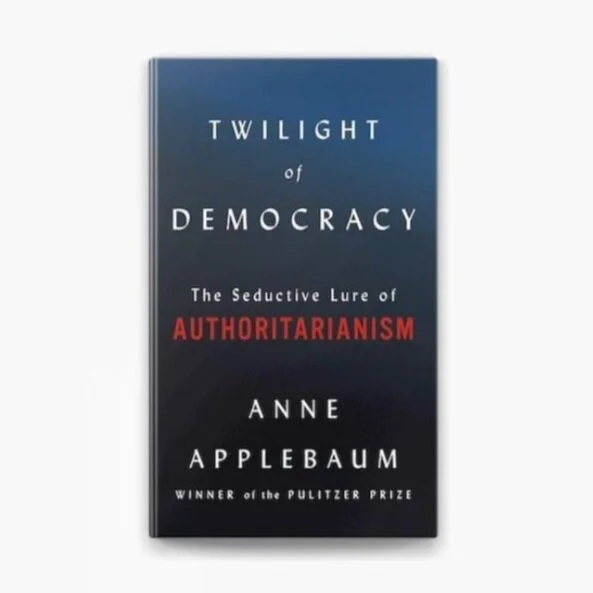Please join us for this Zoom co-presentation with McNally Jackson Booksellers
Anne Applebaum
Staff writer, The Atlantic
Jacob Weisberg
Co-Founder, Pushkin Industries
A Pulitzer Prize–winning historian explains, with electrifying clarity, why elites in democracies around the world are turning toward nationalism and authoritarianism.
From the United States and Britain to continental Europe and beyond, liberal democracy is under siege, while authoritarianism is on the rise. In Twilight of Democracy, Anne Applebaum, an award-winning historian of Soviet atrocities who was one of the first American journalists to raise an alarm about antidemocratic trends in the West, explains the lure of nationalism and autocracy. In this captivating essay, she contends that political systems with radically simple beliefs are inherently appealing, especially when they benefit the loyal to the exclusion of everyone else.
Despotic leaders do not rule alone; they rely on political allies, bureaucrats, and media figures to pave their way and support their rule. The authoritarian and nationalist parties that have arisen within modern democracies offer new paths to wealth or power for their adherents. Applebaum describes many of the new advocates of illiberalism in countries around the world, showing how they use conspiracy theory, political polarization, social media, and even nostalgia to change their societies.
Elegantly written and urgently argued, Twilight of Democracy is a brilliant dissection of a world-shaking shift and a stirring glimpse of the road back to democratic values.
Join us for this special UNA-NYC co-presentation with McNally Jackson Booksellers, and sit in on this timely conversation with Anne Applebaum and Jacob Weisberg.
Guest Speakers
ANNE APPLEBAUM
Anne Applebaum is a staff writer for The Atlantic and a Pulitzer-prize winning historian. She is also a Senior Fellow of International Affairs and Agora Fellow in Residence at the Johns Hopkins School of Advanced International Studies, where she co-directs LSE Arena, a program on disinformation and 21st century propaganda.
A Washington Post columnist for fifteen years and a former member of the editorial board, she has also worked as the Foreign and Deputy Editor of the Spectator magazine in London, as the Political Editor of the Evening Standard, and as a columnist at Slate and at several British newspapers, including the Daily and Sunday Telegraph. From 1988-91 she covered the collapse of communism as the Warsaw correspondent of The Economist magazine and The Independent newspaper.
Red Famine: Stalin's War on Ukraine was published in October 2017. It received the Lionel Gelber Prize as well as the Duff Cooper prize in 2018. Her previous book, Iron Curtain: The Crushing of Eastern Europe, 1944-1956, described the imposition of Soviet totalitarianism in Central Europe after the Second World War. Iron Curtain won the 2012 Cundill Prize for Historical Literature and the Duke of Westminster Medal, and was a National Book Award finalist. She is also the author of Gulag: A History, which narrates the history of the Soviet concentration camps system and describes daily life in the camps, making extensive use of recently opened Russian archives as well as memoirs and interviews. Gulag won the Pulitzer Prize for non-fiction in 2004 and was also a National Book Award finalist.
Applebaum is also the co-author of a cookbook, From a Polish Country House Kitchen, and a recently re-published travelogue, Between East and West: Across the Borderlands of Europe, which describes a journey across Lithuania, Belarus and Ukraine made in 1991, just before the break-up of the Soviet Union.
Over the years, her writing has also appeared in The New York Review of Books, The New Yorker, The Wall Street Journal, the New York Times, the Financial Times, the International Herald Tribune, Foreign Affairs, The New Criterion, The Weekly Standard, the New Republic, The National Review, The New Statesman, The Independent, The Guardian, Prospect, Commentaire, Die Welt, Cicero, Gazeta Wyborcza and The Times Literary Supplement, as well as in several anthologies.
She has lectured at Yale, Harvard and Columbia Universities, as well as Oxford, Cambridge, London, Belfast, Heidelberg, Maastricht, Zurich, Humboldt, Texas A&M, Houston and many others. In 2012-13 she held the Phillipe Roman Chair of History and International Relations at the London School of Economics.
Applebaum was born in Washington, DC in 1964. After graduating from Yale University, she was a Marshall Scholar at the LSE and St. Antony’s College, Oxford. Her husband, Radoslaw Sikorski, is a Polish politician and writer. They have two children, Alexander and Tadeusz.
JACOB WEISBERG
Jacob Weisberg is a co-founder and CEO of Pushkin Industries.
Weisberg was previously CEO of the Slate Group, co-founder of Panoply, and editor-in-chief of Slate magazine. He has written for publications including the New York Times, New Yorker, and Financial Times. He is the author of several books and a lecturer at Yale University. Weisberg is vice-chair of the Committee to Protect Journalists and a member of the PEN Board, reflecting his long-standing involvement with issues of global press freedom and independent journalism. He has written about politics and policy for more than a decade.
A native of Chicago, he attended Yale University and New College, Oxford, on a Rhodes Scholarship. From 1989 until 1994, he worked in various capacities (Associate Editor, Managing Editor, Deputy Editor and Senior Editor) at The New Republic. Between 1994 and 1996, he wrote the National Interest column for New York Magazine. In the fall of 1996, he joined Slate, the Internet magazine published by Microsoft, to cover the presidential campaign and write a weekly column called "Strange Bedfellow."
Weisberg has also been contributing editor for Vanity Fair and a reporter for Newsweek in London and Washington. He has written freelance for many other publications, including The New Yorker, Partisan Review, Esquire, GQ, The Washington Monthly, The New York Times, The Washington Post, The Sunday Times of London, and The Observer.



